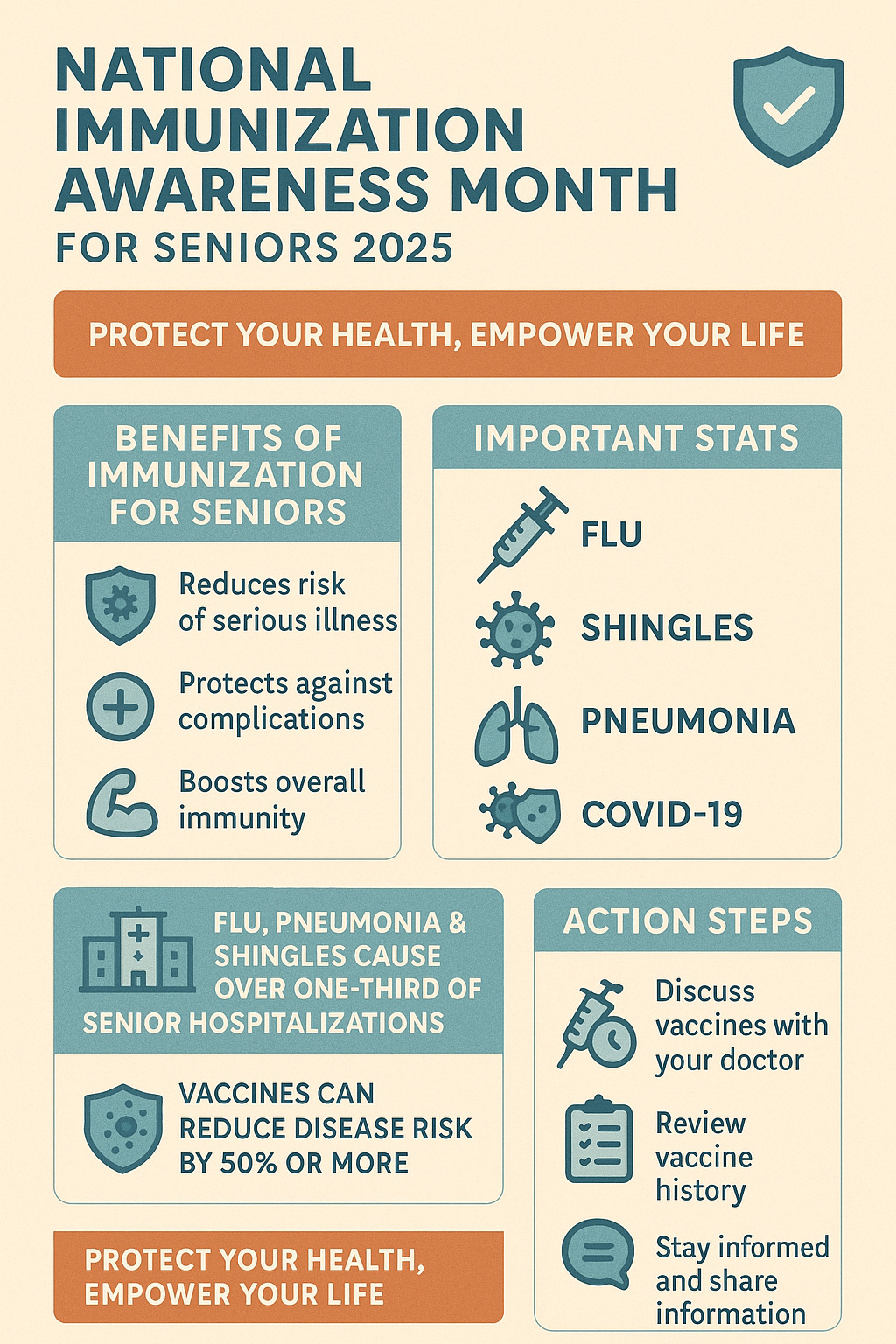Beyond the Flu Shot: The Vaccines That Could Save Your Life
August brings us National Immunization Awareness Month, a crucial time to focus on one of the most important health decisions we can make as we age: staying current with our vaccinations. While immunizations are often associated with childhood, seniors actually face unique health challenges that make vaccines even more essential.
Why Vaccines Matter More as We Age
As we get older, our immune systems naturally weaken, making us more vulnerable to infectious diseases. This process, called immunosenescence, means that illnesses that younger people might shake off can become serious health threats for seniors. Vaccines help bridge this gap by strengthening our body's natural defenses before we encounter these diseases.
The statistics speak for themselves: before widespread immunization programs, the average life expectancy in the U.S. was just 43.7 years. Today, we're living to an average of 79.4 years, with vaccines playing a significant role in this dramatic improvement.
Essential Vaccines for Seniors
While specific recommendations should always be discussed with your healthcare provider, several vaccines are particularly important for adults 65 and older:
Annual Flu Vaccine: The seasonal influenza vaccine is recommended yearly for all adults, but it's especially crucial for seniors who face higher risks of complications.
COVID-19 Vaccines: Staying current with COVID-19 vaccinations remains important, with updated formulations available to address new variants.
Pneumococcal Vaccines: These protect against pneumonia and other serious infections that can be particularly dangerous for older adults.
Shingles Vaccine: The shingles (zoster) vaccine is recommended for adults 50 and older to prevent this painful condition that becomes more common with age.
Tdap Booster: Tetanus, diphtheria, and pertussis protection should be updated every 10 years.
RSV Vaccine: Recent advances include RSV immunizations that specifically protect older adults.
Breaking Down Common Concerns
Many seniors have questions or concerns about vaccines. This is completely normal and understandable. The key is having open conversations with healthcare providers you trust. Today's vaccines undergo rigorous testing and monitoring to ensure they're both safe and effective.
Healthcare professionals emphasize that vaccines work by helping your body learn to defend itself without the dangers of actual infection. They essentially give your immune system a practice run against dangerous diseases.
Making Vaccination Accessible
One of the biggest barriers to vaccination can be access. Many healthcare systems now offer:
Transportation services to and from vaccination appointments
Integrated care where vaccines can be administered during regular medical visits
Community-based clinics that bring vaccines directly to senior living communities
Coordination with state immunization registries to track your vaccination history
Taking Action This Month
National Immunization Awareness Month provides the perfect opportunity to review your vaccination status. Here's what you can do:
Schedule a consultation with your healthcare provider to review which vaccines you need. Bring any vaccination records you have, as this helps determine what's current.
Ask questions freely. Your healthcare team wants to address any concerns you might have about vaccines.
Consider catch-up vaccinations if you've missed any recommended shots.
Talk with family and friends about the importance of staying vaccinated, as community immunity helps protect everyone.
The Bigger Picture
When you get vaccinated, you're not just protecting yourself – you're contributing to community health. This is especially important in senior living communities where residents may have varying levels of immunity. Each vaccination helps create a protective barrier that shields the most vulnerable members of our communities.
The theme for National Immunization Awareness Month 2025 is "Don't let history repeat itself. Protect your future. Get immunized". This message resonates particularly strongly for seniors who may remember when diseases like polio and measles were serious threats.
Vaccines represent one of the most successful public health achievements in history. As we celebrate National Immunization Awareness Month, remember that staying current with vaccinations is one of the most important steps you can take to maintain your health and independence as you age.
Don't wait – use this month - and next - as your reminder to have that important conversation with your healthcare provider about your vaccination needs. Your future self will thank you for taking this proactive step toward healthy aging.


